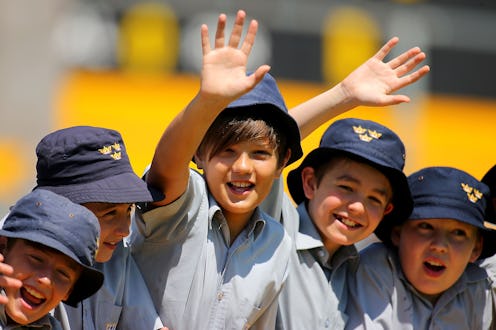News
Motivation Might Be Demotivating Kids
Brace yourself, kids: A new study out of England's Southampton University indicates that showering praise on children with low self-esteem could actually be harmful. Parents or instructors who coo and coddle these types of kids may be unintentionally setting up greater anxieties for them, according to researchers. Using words such as "incredibly good" can backfire, and children with low self-esteem often worry that they might not be able to repeat their successes in the future.
“It demotivates them, and we believe that when these children hear these words they take it as an illicit message that they have to keep to high standards,” noted psychology professor Sam Thomaes. “This scares them: They think they won’t be able to live up to it.”
But the same doesn't go for confident children, who often take praise and thrive. In the experiment, researchers had 144 mothers give timed math tests to their children, and not skimp on the encouragement.
The mothers applauded their kids an average of six times during the exercise, and about 25 percent of the cooing was deemed "inflated praise." Inflated praise, for the purpose of the study, was an extra superlative — like "you did incredibly well," over "you did well."
Then, the kids were given a famous Van Gogh painting, Wild Roses , to replicate. Afterwards, their paintings were critiqued by a "professional painter."
But when the kids were allowed to choose the paintings they'd imitate, those with low self-esteem leaned towards the easier ones. Even though they were told they they wouldn't "learn much" from attempting a replica of the easier paintings. And of harder ones? "You'll definitely learn a lot," they were urged.
Responded the kids with lower self-esteem: nuh-uh.
Yes, in a world where your clout — and Klout — are measured by likes, followers, re-pins, and snaps, it's hard not to expect instant gratification. But as Ally Fogg at The Guardian says, maybe it's time to cut back on the praise for every single little thing your kid does.
It is more effective to say 'oh, look what a clever thing you've done', than 'oh, look how clever you are'. This is a useful application of what social psychologists call attribution theory. The same principles decree that you will get better results disciplining your offspring by telling him/her that she or he has done a bad thing than that she or he is a naughty child. It is more important for children to learn that we are what we do, than vice versa.
Comedian Sebastian Maniscalco has the right idea: Face it, sometimes your kid just sucks at something. That's life.
Image: Paul Kane/Getty Images; Giphy
